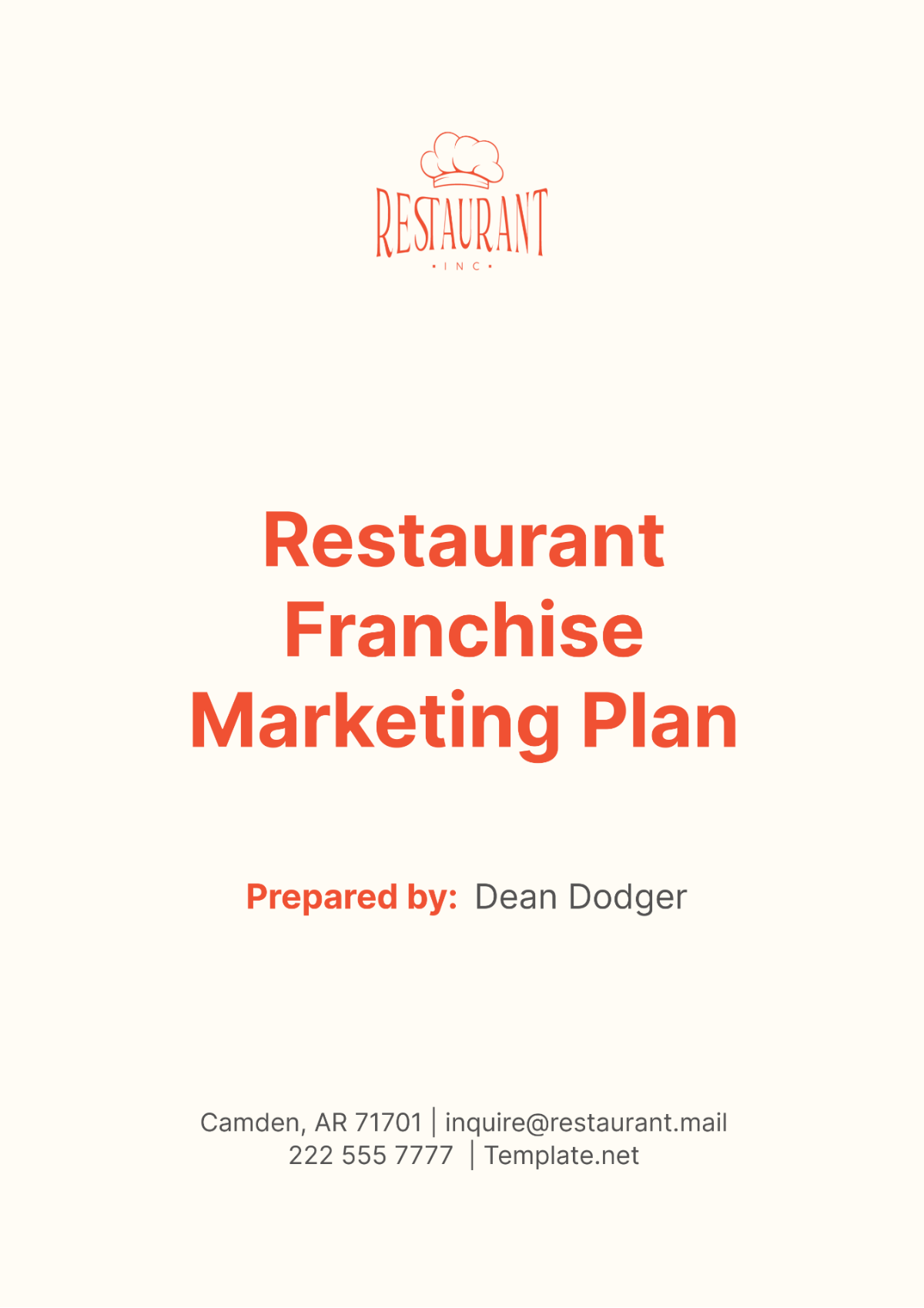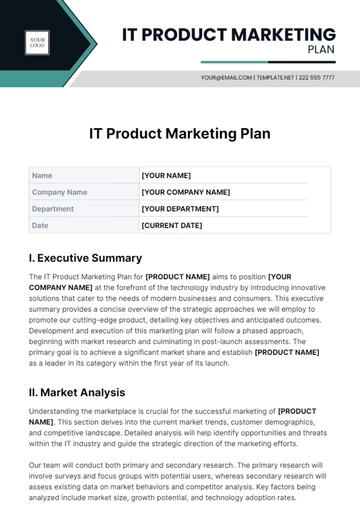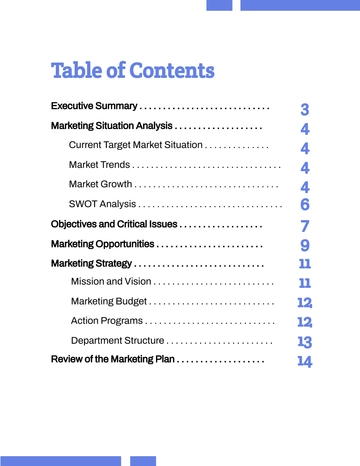Free Restaurant Franchise Marketing Plan

I. Executive Summary
This Restaurant Franchise Marketing Plan for [Your Company Name] is a comprehensive blueprint that outlines the strategies and tactics that will be employed to promote our brand and attract franchisees. This plan is designed to ensure the growth and success of our franchise network, which is integral to the overall success of our brand. The plan is rooted in our understanding of the market, our target audience, and the unique value proposition of our brand. It encompasses various aspects of marketing, from branding and digital marketing to traditional marketing and franchisee support.
The purpose of this marketing plan is threefold. Firstly, it aims to increase the visibility of our brand in the market. This is crucial for attracting potential franchisees and customers. Secondly, the plan is designed to attract potential franchisees by providing them with detailed information about our franchise opportunity and demonstrating the support we provide to our franchisees. Lastly, the plan outlines the support we provide to our existing franchisees to ensure their success. This includes comprehensive training programs, marketing support, and ongoing operational support.
The total budget allocated for implementing the strategies outlined in this plan is $40,000. This budget covers all aspects of our marketing efforts, including advertising costs, promotional materials, and marketing support for franchisees. It is designed to ensure that all our marketing efforts are financially feasible and sustainable. The budget allocation is carefully planned to optimize the return on investment and drive the growth of our franchise network. By investing in our marketing strategies, we aim to expand our restaurant franchise network and ensure the continued growth and success of [Your Company Name].
II. Marketing Objectives
The marketing objectives of this plan are the guiding principles that will steer our promotional efforts for [Your Company Name]. These objectives are not only aligned with our overall business goals but are also crucial for the expansion of our franchise network.
A. Increase Brand Visibility
One of our primary marketing objectives is to increase brand visibility. This involves:
Digital Presence: Enhancing our digital presence across various online platforms, including social media, search engines, and restaurant review sites. A strong digital presence can help us reach a wider audience and make our brand more recognizable. It also allows us to engage with our customers directly and respond to their feedback in real-time.
Local Marketing: Engaging in local marketing efforts, such as participating in community events, sponsoring local sports teams, or partnering with other local businesses. These efforts can help us establish a strong presence in our local community and build relationships with potential customers.
Public Relations: Utilizing public relations strategies, such as press releases, media interviews, and influencer partnerships, to generate positive publicity for our brand. This can help us reach a larger audience and enhance our brand reputation.
In-Store Promotions: Hosting in-store promotions, such as special discounts, loyalty programs, or themed events, to attract customers to our restaurants. These promotions can create excitement around our brand and encourage customers to visit our restaurants.
B. Attract Potential Franchisees
Another key marketing objective is to attract potential franchisees. This involves:
Franchise Marketing: Developing targeted marketing campaigns to attract potential franchisees. This could include digital advertising, direct mail campaigns, or franchise trade shows.
Franchise Information: Providing detailed information about our franchise opportunity on our website, in our marketing materials, and in our communications with potential franchisees. This information should highlight the benefits of owning a [Your Company Name] franchise and provide clear steps on how to become a franchisee.
Franchise Support: Demonstrating the support we provide to our franchisees, such as training programs, marketing support, and ongoing operational support. This can reassure potential franchisees that they will receive the help they need to succeed.
Franchise Success Stories: Sharing success stories from our existing franchisees. These stories can inspire potential franchisees and show them the potential for success with [Your Company Name].
III. Marketing Strategies
Our marketing strategies are designed to achieve our marketing objectives. These strategies include a mix of digital and traditional marketing tactics, each tailored to our target market and designed to maximize our reach and impact.
A. Branding Strategy
Our branding strategy is at the core of our marketing efforts. This involves:
Brand Identity: Establishing a strong brand identity that reflects the values and mission of [Your Company Name]. This includes creating a distinctive logo, color scheme, and tagline that are instantly recognizable and resonate with our target market.
Brand Consistency: Ensuring brand consistency across all marketing channels and customer touchpoints. This means that our brand’s look, feel, and message are consistent, whether a customer interacts with us online, in print, or in person at one of our restaurants.
Brand Storytelling: Telling our brand’s story in a way that connects with our target market on an emotional level. This could involve sharing the history of [Your Company Name], highlighting our commitment to quality and customer service, or showcasing the people behind our brand.
Brand Positioning: Positioning our brand in the minds of our target market in a way that differentiates us from our competitors. This involves identifying our unique selling proposition and communicating it effectively through our marketing efforts.
Brand Awareness: Increasing brand awareness among our target market. This involves using various marketing tactics to ensure that our target market knows about [Your Company Name] and what we stand for.
B. Digital Marketing Strategy
Our digital marketing strategy plays a crucial role in reaching our target market and achieving our marketing objectives. This includes:
Website Optimization: Ensuring that our website is user-friendly, search engine optimized, and provides all the necessary information for potential franchisees. This includes information about our brand, our franchise opportunity, and how to get in touch with us.
Social Media Marketing: Leveraging social media platforms to engage with our audience, increase brand visibility, and drive traffic to our website. This involves creating engaging content, responding to comments and messages, and staying up-to-date with the latest social media trends.
Email Marketing: Using email marketing to stay in touch with our audience, provide them with valuable content, and promote our franchise opportunity. This involves building an email list, segmenting it based on user behavior, and sending out regular newsletters and promotional emails.
Content Marketing: Creating valuable content that attracts, engages, and converts our target audience. This could include blog posts, videos, infographics, and guides related to the restaurant industry and franchising.
Search Engine Optimization (SEO): Optimizing our website and content to rank higher in search engine results pages. This involves keyword research, on-page optimization, and building high-quality backlinks.
C. Traditional Marketing Strategy
While digital marketing is crucial in today’s world, traditional marketing methods still have their place in our marketing strategy. This includes:
Print Advertising: Using print advertising in local newspapers, magazines, and trade publications to reach a local audience and raise awareness of our franchise opportunity.
Direct Mail: Sending direct mail to potential franchisees who have expressed interest in our franchise opportunity. This could include a brochure detailing our franchise opportunity, a letter from our CEO, or an invitation to an upcoming franchise event.
Networking Events: Attending industry trade shows, business expos, and local networking events to meet potential franchisees in person, build relationships, and promote our franchise opportunity.
Public Relations: Working with a PR agency to secure media coverage in local and national media outlets. This could involve press releases, media interviews, and feature stories about our franchise.
Community Involvement: Getting involved in local community events and initiatives to build goodwill and raise awareness of our brand. This could include sponsoring local sports teams, participating in charity events, or hosting community events at our restaurants.
IV. Budget
The budget for our marketing plan is a crucial component that ensures all our marketing efforts are financially feasible and sustainable. It covers all aspects of our marketing efforts, including advertising costs, promotional materials, and marketing support for franchisees. The following chart and table provide the breakdown of our proposed marketing budget:
Marketing Activity | Estimated Cost |
|---|---|
Branding Strategy | $10,000 |
Digital Marketing Strategy | $15,000 |
Traditional Marketing Strategy | $10,000 |
Franchisee Support | $5,000 |
Total | $40,000 |
A. Branding Strategy
The estimated cost for our branding strategy is $10,000. This includes costs associated with creating a distinctive logo, color scheme, and tagline, as well as other branding activities such as brand storytelling and positioning. Investing in our branding strategy is crucial as it helps to create a strong, recognizable brand that resonates with our target market.
B. Digital Marketing Strategy
Our digital marketing strategy has an estimated cost of $15,000. This includes costs associated with website optimization, social media marketing, email marketing, content marketing, and search engine optimization. Given the increasing importance of digital marketing in today’s world, this investment is essential for reaching our target market and achieving our marketing objectives.
C. Traditional Marketing Strategy
The estimated cost for our traditional marketing strategy is $10,000. This includes costs associated with print advertising, direct mail, networking events, public relations, and community involvement. Despite the rise of digital marketing, traditional marketing methods still hold significant value, especially in reaching local audiences and building strong community ties.
D. Franchisee Support
The budget allocated for franchisee support is $5,000. This covers the costs of providing training programs, marketing support, and ongoing operational support to our franchisees. Investing in franchisee support is crucial as it not only helps our franchisees succeed but also ensures the consistent delivery of our brand promise across all our franchises.
E. Total
The total estimated budget for our marketing plan is $40,000. This budget is designed to ensure that all our marketing efforts are financially feasible and sustainable. It’s important to note that while this is an estimate, actual costs may vary based on market conditions, specific campaign results, and other factors.
Investing in our marketing strategies is crucial for the growth and success of [Your Company Name]. Each dollar invested in our marketing efforts is a step towards increasing our brand visibility, attracting potential franchisees, and supporting our existing franchisees. By allocating a dedicated budget for our marketing efforts, we can plan our strategies effectively, measure our return on investment, and make data-driven decisions.
It’s also important to remember that the effectiveness of our marketing strategies is not solely determined by the size of our budget. Creativity, strategic planning, and a deep understanding of our target market are equally, if not more, important. Therefore, while we aim to optimize our budget to achieve the highest possible return on investment, we also focus on continuously improving our marketing strategies and adapting to the changing needs of our target market. This balanced approach ensures that [Your Company Name] remains competitive in the restaurant franchise industry and continues to grow and succeed.
V. Franchisee Support
Providing comprehensive support to our franchisees is a cornerstone of [Your Company Name]'s franchise marketing plan. We believe that the success of our franchisees is integral to the overall success of our brand, and we are committed to providing them with the resources and assistance they need to thrive.
A. Training Programs
One of the key support mechanisms we provide to our franchisees is our training programs. These programs are designed to equip our franchisees with the skills and knowledge they need to successfully operate their restaurant. This includes:
Operational Training: We provide comprehensive training on all aspects of restaurant operations, from kitchen management to customer service. This ensures that our franchisees are well-equipped to run their restaurants efficiently and provide a high-quality dining experience to their customers.
Business Management Training: We offer training on essential business management skills, such as financial management, human resources, and local marketing. This helps our franchisees to effectively manage their business and make informed decisions.
Brand Standards Training: We conduct training on our brand standards and values. This ensures that our franchisees understand what our brand stands for and how to deliver a consistent brand experience to their customers.
Ongoing Training: We provide ongoing training to our franchisees to keep them updated on the latest trends in the restaurant industry, new menu items, and changes in our operational procedures or brand standards.
B. Marketing Support
We provide extensive marketing support to our franchisees to help them attract customers and grow their business. This includes:
Access to Marketing Materials: We provide our franchisees with access to a wide range of marketing materials, such as brochures, posters, and digital assets, which they can use in their local marketing efforts.
Local Marketing Guidance: We offer guidance and support to our franchisees in planning and executing their local marketing campaigns. This includes helping them to identify the most effective marketing channels, develop compelling marketing messages, and measure the success of their campaigns.
Promotional Campaigns: We organize regular promotional campaigns, such as seasonal offers or new menu launches, which our franchisees can participate in to attract customers and boost sales.
Online Presence: We assist our franchisees in establishing and managing their online presence, including their restaurant’s website and social media profiles. This helps them to reach a wider audience and engage with their customers online.
C. Ongoing Support
In addition to training and marketing support, we provide ongoing support to our franchisees to help them overcome challenges and achieve their business goals. This includes:
Operational Support: We provide ongoing operational support to our franchisees, including advice on supply chain management, equipment maintenance, and staff training. This helps our franchisees to run their restaurants smoothly and efficiently.
Performance Monitoring: We regularly monitor the performance of our franchisees and provide them with feedback and recommendations for improvement. This helps our franchisees to continuously improve their performance and achieve their business goals.
Peer Networking: We facilitate networking opportunities among our franchisees, allowing them to learn from each other’s experiences and share best practices.
VI. Conclusion and Next Steps
A. Conclusion
This Restaurant Franchise Marketing Plan for [Your Company Name] provides a comprehensive strategy for promoting our brand, attracting potential franchisees, and supporting our existing franchisees. By understanding our market, implementing effective marketing strategies, and providing comprehensive support to our franchisees, we are confident that we can grow our franchise network and achieve success in the restaurant industry.
Our analysis has shown that a strong brand, coupled with effective marketing strategies and comprehensive franchisee support, is key to attracting potential franchisees and ensuring the success of our existing ones. As we move forward, these elements will continue to be at the forefront of our efforts. We will continue to invest in our brand, refine our marketing strategies based on market trends and feedback, and provide our franchisees with the support they need to succeed.
B. Next Steps
As we move forward with the implementation of our marketing plan, there are several key steps that we will need to take to ensure its success:
Monitoring and Evaluation: Regular monitoring and evaluation of our marketing strategies is crucial. This will allow us to track our progress, measure the effectiveness of our strategies, and make data-driven decisions. We will need to set up a system for tracking key performance indicators, such as brand visibility, number of potential franchisees attracted, and success of our existing franchisees.
Feedback Collection: Gathering feedback from our franchisees and customers will be an ongoing process. Their insights and experiences can provide valuable information that can help us refine our strategies. We will need to establish channels for feedback collection, such as surveys, feedback forms, or regular check-ins with our franchisees.
Strategy Adjustment: Based on the results of our monitoring and evaluation and the feedback we receive, we may need to adjust our strategies. This could involve tweaking our messaging, trying new marketing channels, or adjusting our marketing budget. The goal is to continuously improve our strategies to maximize their effectiveness.
Ongoing Training and Support: As the restaurant industry evolves, we will need to provide ongoing training and support to our franchisees. This will ensure that they are equipped with the latest skills and knowledge to successfully operate their restaurant. We will need to regularly update our training programs and provide timely support to our franchisees.
Regular Communication: Maintaining regular communication with our franchisees is key to building strong relationships and ensuring their success. We will need to establish regular check-ins with our franchisees to discuss their progress, address their concerns, and provide them with the support they need.
- 100% Customizable, free editor
- Access 1 Million+ Templates, photo’s & graphics
- Download or share as a template
- Click and replace photos, graphics, text, backgrounds
- Resize, crop, AI write & more
- Access advanced editor
Unlock the full potential of your restaurant franchise's marketing initiatives with the editable and customizable Restaurant Franchise Marketing Plan Template only here on Template.net! Our AI Editor Tool makes it simple to create a comprehensive marketing plan that drives brand awareness and increases sales. Take your initiative to new heights!





























